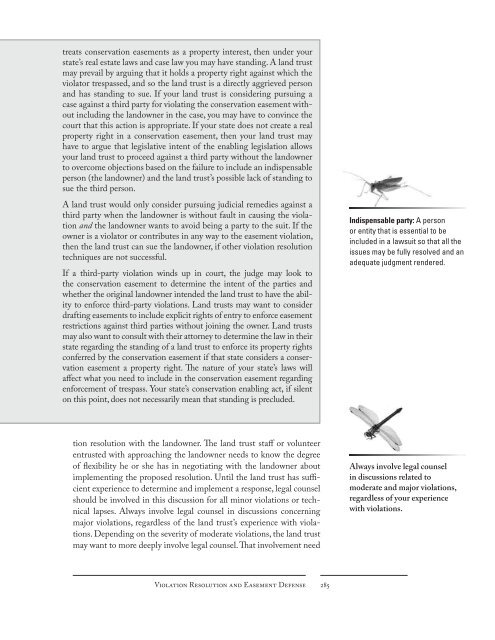Managing Conservation Easements in Perpetuity - Environmental ...
Managing Conservation Easements in Perpetuity - Environmental ...
Managing Conservation Easements in Perpetuity - Environmental ...
Create successful ePaper yourself
Turn your PDF publications into a flip-book with our unique Google optimized e-Paper software.
treats conservation easements as a property <strong>in</strong>terest, then under your<br />
state’s real estate laws and case law you may have stand<strong>in</strong>g. A land trust<br />
may prevail by argu<strong>in</strong>g that it holds a property right aga<strong>in</strong>st which the<br />
violator trespassed, and so the land trust is a directly aggrieved person<br />
and has stand<strong>in</strong>g to sue. If your land trust is consider<strong>in</strong>g pursu<strong>in</strong>g a<br />
case aga<strong>in</strong>st a third party for violat<strong>in</strong>g the conservation easement without<br />
<strong>in</strong>clud<strong>in</strong>g the landowner <strong>in</strong> the case, you may have to conv<strong>in</strong>ce the<br />
court that this action is appropriate. If your state does not create a real<br />
property right <strong>in</strong> a conservation easement, then your land trust may<br />
have to argue that legislative <strong>in</strong>tent of the enabl<strong>in</strong>g legislation allows<br />
your land trust to proceed aga<strong>in</strong>st a third party without the landowner<br />
to overcome objections based on the failure to <strong>in</strong>clude an <strong>in</strong>dispensable<br />
person (the landowner) and the land trust’s possible lack of stand<strong>in</strong>g to<br />
sue the third person.<br />
A land trust would only consider pursu<strong>in</strong>g judicial remedies aga<strong>in</strong>st a<br />
third party when the landowner is without fault <strong>in</strong> caus<strong>in</strong>g the violation<br />
and the landowner wants to avoid be<strong>in</strong>g a party to the suit. If the<br />
owner is a violator or contributes <strong>in</strong> any way to the easement violation,<br />
then the land trust can sue the landowner, if other violation resolution<br />
techniques are not successful.<br />
If a third-party violation w<strong>in</strong>ds up <strong>in</strong> court, the judge may look to<br />
the conservation easement to determ<strong>in</strong>e the <strong>in</strong>tent of the parties and<br />
whether the orig<strong>in</strong>al landowner <strong>in</strong>tended the land trust to have the ability<br />
to enforce third-party violations. Land trusts may want to consider<br />
draft<strong>in</strong>g easements to <strong>in</strong>clude explicit rights of entry to enforce easement<br />
restrictions aga<strong>in</strong>st third parties without jo<strong>in</strong><strong>in</strong>g the owner. Land trusts<br />
may also want to consult with their attorney to determ<strong>in</strong>e the law <strong>in</strong> their<br />
state regard<strong>in</strong>g the stand<strong>in</strong>g of a land trust to enforce its property rights<br />
conferred by the conservation easement if that state considers a conservation<br />
easement a property right. The nature of your state’s laws will<br />
affect what you need to <strong>in</strong>clude <strong>in</strong> the conservation easement regard<strong>in</strong>g<br />
enforcement of trespass. Your state’s conservation enabl<strong>in</strong>g act, if silent<br />
on this po<strong>in</strong>t, does not necessarily mean that stand<strong>in</strong>g is precluded.<br />
tion resolution with the landowner. The land trust staff or volunteer<br />
entrusted with approach<strong>in</strong>g the landowner needs to know the degree<br />
of flexibility he or she has <strong>in</strong> negotiat<strong>in</strong>g with the landowner about<br />
implement<strong>in</strong>g the proposed resolution. Until the land trust has sufficient<br />
experience to determ<strong>in</strong>e and implement a response, legal counsel<br />
should be <strong>in</strong>volved <strong>in</strong> this discussion for all m<strong>in</strong>or violations or technical<br />
lapses. Always <strong>in</strong>volve legal counsel <strong>in</strong> discussions concern<strong>in</strong>g<br />
major violations, regardless of the land trust’s experience with violations.<br />
Depend<strong>in</strong>g on the severity of moderate violations, the land trust<br />
may want to more deeply <strong>in</strong>volve legal counsel.That <strong>in</strong>volvement need<br />
Violation Resolution and Easement Defense 285<br />
Indispensable party: A person<br />
or entity that is essential to be<br />
<strong>in</strong>cluded <strong>in</strong> a lawsuit so that all the<br />
issues may be fully resolved and an<br />
adequate judgment rendered.<br />
Always <strong>in</strong>volve legal counsel<br />
<strong>in</strong> discussions related to<br />
moderate and major violations,<br />
regardless of your experience<br />
with violations.


